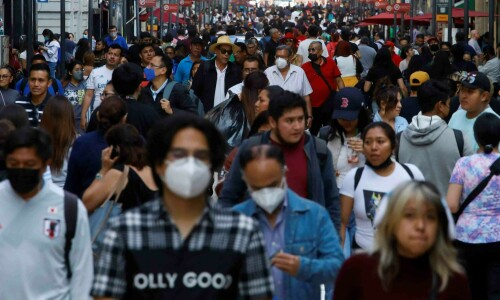PESHAWAR: The government has issued guidelines to hospitals regarding use of personal protective equipments by health workers engaged in management and treatment of possible and active Covid-19 patients to avoid infection as the supplies continues on daily basis.
The health department has informed the hospitals that all the healthcare providers don’t need PPEs but only those, who come into contact with the Covid-19 patients in OPD, intensive care unit, and high dependency units require protection.
The health workers have been demanding protective gears as scores of them have got infection from the patients.
The 8-page document prepared by Aga Khan University Hospital Karachi, Shaukat Khanum Memorial Cancer Hospital and Research Centre, National Institute of Health Islamabad and National Disaster Management Authority has been sent to the hospitals to ensure safety of staff by using PPEs.
As there is worldwide shortage of PPEs, so the department wants to ensure its use where these are needed.
Authorities at hospitals say they have received items but not in sufficient quantity
The guidelines similar to those of the WHO, circulated to its member countries, recommend that the healthcare providers having close contacts with Covid-19 patients need N95 masks, gloves, body gowns, goggles for eye protection while the ones indulged in aerosol-generating procedures performed on Covid-19 patients don’t require body gowns but they need Tyvek suit.
The cleaners and visitors entering the room of Covid-19 patients require medical mask, gloves, body gowns, goggles and shoe-covers.
The staff with no direct contact with patients needs only medical masks and practice rule of social distancing by staying a meter away whereas those deployed at the triages in hospitals should use medical masks and social distancing and while the administrative and all other staff should only practice social distancing rules.
In OPDs, the physicians examining the patients with respiratory problems need N95 mask, gloves, body gowns, eye protection goggles. The doctors examining patients with respiratory problem need gloves and body gowns.
Healthcare providers involved in home-based services to Covid-19 patients require N95 masks, body gowns, gloves and eye protection. There is no need of PPEs while interviewing the suspected or confirmed Covid-19 patients to know about their contacts but only social distancing to be practiced.
It has also given instructions on collection and transportation of samples to the laboratory for analysis. The people working with suspected patients in temporary isolation areas should wear medical masks while cleaners in the same vicinity need N95 masks, body gowns, eye protection goggles and gloves.
The laboratory staff requires N95 masks, gloves, eye protection, Tyvek suit, shoe covers and powered, air-purifying respirator (PAPR) along with proper bio-safety and bio-security protocols.
In addition to using the appropriate PPE, frequent hand hygiene and respiratory hygiene should always be performed and PPE should be discarded in an appropriate waste container after use while hand hygiene should be performed before putting on and after taking them off.
According to the guideline, the number of visitors should be restricted. If visitors enter a Covid-19 patient’s room, they should be provided with clear instructions about how to put on and remove PPEs and about performing hand hygiene before putting on and after removing them.
Meanwhile, authorities at the hospitals say that they have received supplies but not in sufficient quantity for the anticipated deluge of patients in the next few weeks. All hospitals need to get prepared for the expected exponential rise in number of patients.
They said that the federal government informed Supreme Court that the number of Covid-19 patients was expected to rise to 50,000 in the next fortnight and none of the hospitals had supplies to cope with such a large number of patients.
National Disaster Management Authority on Wednesday announced it would supply the items to hospitals directly to bypass provincial red tape and delay in the delivery of medical supplies.
Otherwise, Khyber Pakhtunkhwa might go Quetta’s way where young doctors refused to attend Covid-19 patients, the other day, because of lack of PPEs. The hospital authorities asked the government to ensure adequate supplies in all hospitals before the floodgates opened.
Published in Dawn, April 9th, 2020













































